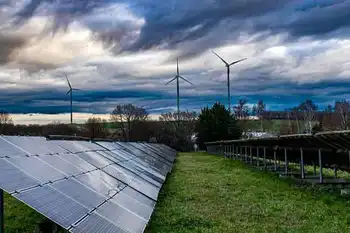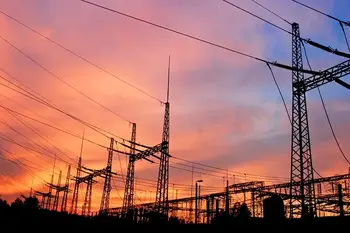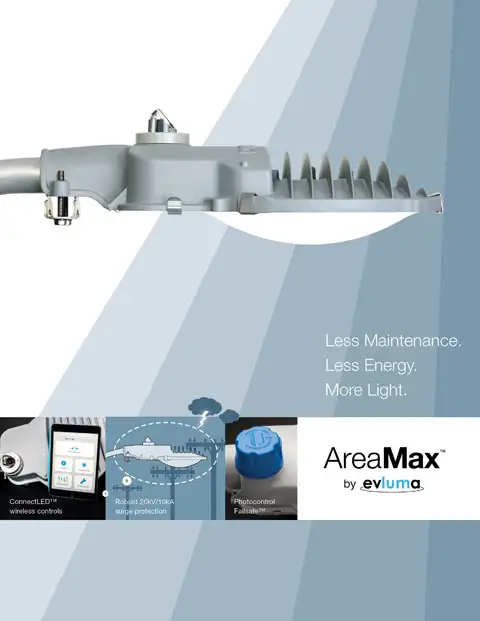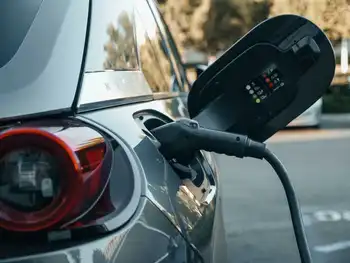Europe's Green Surge: Renewables Soar, Emissions Plummet, but Challenges Remain

CSA Z463 Electrical Maintenance
Our customized live online or in‑person group training can be delivered to your staff at your location.

- Live Online
- 6 hours Instructor-led
- Group Training Available
EU Renewable Energy Transition accelerates wind and solar growth, slashes fossil fuels and carbon emissions via the ETS, strengthens energy security with LNG diversification, and advances grid resilience toward 2030 climate targets.
Key Points
EU shift to wind, solar, and efficiency that cuts fossil fuels while boosting energy security and grid stability
✅ Fossil fuels at 29% of EU power in 2023, coal and gas down sharply
✅ Renewables hit 44% share; wind 18%, solar 9% and rising
✅ ETS, LNG diversification, and efficiency cut demand and emissions
Europe's energy landscape is undergoing a dramatic transformation, fueled by a surge in renewable energy and a corresponding decline in fossil fuel dependence. This shift, documented in both a report from the energy think tank Ember and the European Commission's State of the Energy Union report, paints a picture of progress, but also highlights the challenges that lie ahead on the path to a sustainable future.
Fossil Fuels Facing an Unprecedented Decline:
Fossil fuels dipped to their lowest point in recorded history, making up only 29% of EU electricity generation in 2023. This represents a significant 19% decrease in both fossil fuel generation and carbon emissions compared to 2022, exceeding even the reductions witnessed during the pandemic. Coal, the dirtiest fossil fuel, saw the steepest decline, dropping by 26%, while gas generation fell by 15%. This decline is attributed to a combination of factors, including:
Increased deployment of renewables: As renewable energy sources like wind and solar become more affordable and efficient, they are increasingly displacing fossil fuels in the energy mix.
Carbon pricing: The EU's Emissions Trading System (ETS) puts a price on carbon emissions, incentivizing generators to switch to cleaner sources of energy.
Geopolitical tensions: The war in Ukraine and subsequent sanctions on Russia have accelerated Europe's efforts to diversify its energy sources away from Russian fossil fuels across the bloc.
Renewables Ascending to New Heights:
Renewable energy is now the dominant force in the EU, as renewables surpassed fossil fuels in the power mix, contributing a record-breaking 44% of the electricity mix. Wind energy leads the charge, generating 18% of electricity – the equivalent of France's entire demand – and surpassing gas for the first time. Solar power also continues to grow, reaching a 9% share, as solar reshapes electricity prices in Northern Europe and hydropower recovered from its 2022 dry spell. This remarkable growth is driven by factors such as:
Favorable policy frameworks: The EU has set ambitious renewable energy targets and implemented supportive policies, including feed-in tariffs and auctions.
Technological advancements: Advancements in wind turbine and solar panel technologies have made them more efficient and cost-effective.
Public support: There is growing public support for renewable energy, driven by concerns about climate change and energy security.
Beyond generation, energy efficiency is playing a critical role in reducing overall energy demand. Electricity demand in the EU fell by 3.4% in 2023, thanks to factors such as improved building insulation and more efficient appliances.
EU on Track to Quit Russian Fossil Fuels:
The report underscores Europe's progress in reducing dependence on Russian fossil fuels. Imports of Russian gas have plummeted to 40-45 billion cubic metres, compared to a staggering 155 bcm in 2021. This represents a remarkable 70% reduction in just one year. This shift has been achieved through a combination of increased LNG imports, diversification of gas suppliers, and accelerated deployment of renewable energy sources.
Overall greenhouse gas emissions decreased by 3% in 2022, putting the EU on track to achieve its ambitious 55% reduction target by 2030. These achievements demonstrate the EU's commitment to climate action and its ability to respond decisively to geopolitical challenges.
Success, But Not Complacency:
Despite the positive developments, the Commission warns against complacency. Energy markets remain volatile, fossil fuel subsidies are rising in some countries, and critical infrastructure vulnerabilities persist, while some advocates call for a fossil fuel lockdown to accelerate the transition. The bloc needs to accelerate renewable energy expansion to reach the legally binding 42.5% target by 2030. Additionally, ensuring affordability and security of energy supply will be crucial to maintaining public support for the transition.
Challenges and Opportunities:
While some countries like Denmark, Finland, and the Netherlands fall short of EU climate and energy goals, others like Spain, Portugal, and Belgium showcase success with renewables. The Commission is taking action with a plan to support the wind industry, where investments in European wind continue, even as it faces challenges from high inflation and increasing competition from China. Additionally, ensuring timely updates to national energy and climate plans is crucial for achieving the EU's overall objectives.
NGOs Urge Faster Action:
NGOs like the Climate Action Network (CAN) express concern about the adequacy of national plans, highlighting the gap between ambition and concrete action. They urge member states to accelerate efforts to meet the 2030 targets and avoid a "lost decade" in climate action. CAN emphasizes the need for more ambitious national energy and climate plans, increased investment in renewables, and accelerated energy efficiency measures.
Europe's energy transition is progressing rapidly, with renewables taking center stage and emissions declining. However, significant challenges remain, necessitating continued commitment, national-level action, and a focus on affordability, security, and sustainability. As 2030 approaches, Europe's green surge must translate into concrete results to secure a climate-neutral future.
Looking ahead, several key areas will define the success of Europe's energy transition:
- Accelerating renewable energy deployment: The EU needs to maintain its momentum in building wind, solar, and other renewable energy sources. This requires sustained clean energy investment, streamlined permitting processes, and addressing grid integration challenges.
- Ensuring affordability and security of supply: The energy transition must be just and inclusive, ensuring that energy remains affordable for all citizens and businesses. Additionally, diversifying energy sources and enhancing grid resilience are crucial to guarantee energy security.
- Enhancing energy efficiency: Reducing energy demand remains crucial to achieving climate goals and reducing reliance on fossil fuels. This requires continued investments in building energy efficiency, promoting energy-efficient appliances and technologies, and encouraging behavioral changes.
- International cooperation: Climate change and energy security are global challenges. The EU must continue to lead by example as renewables exceed 30% globally and collaborate with other countries on technological advancements, policy innovations, and financial support for developing nations undergoing their own energy transitions.
Europe's green surge is a testament to its ambition and collective action. By addressing the remaining challenges and seizing the opportunities ahead, the EU can pave the way for a sustainable and secure energy future for itself and the world.















